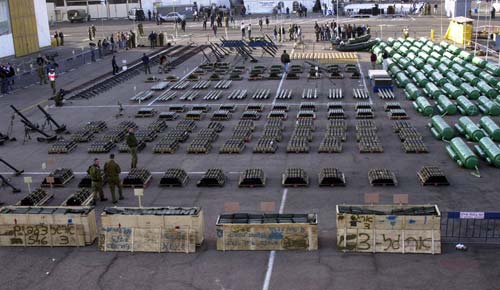|
|
|
Iranian-supplied weapons seized on the Karine A. |
The recent seizure by Israeli commandos of a large weapons cache on board a container ship bound for Syria reveals yet another instance of Tehran’s rash disregard for international law. According to UN Security Council Resolution 1747, it is illegal for the international community to export or engage in commerce of weapons with the Islamic Republic. Interestingly enough, many of the weapons seized by the IDF were manufactured in China and Russia. Iran’s disregard for Resolution 1747, and its dithering over the IAEA’s nuclear deal, demonstrate that it is unwilling to cooperate with both the United States and the United Nations.
The implications of Iran’s chicanery go far beyond the nuclear program. Tehran’s funding of insurgents in Iraq and Afghanistan (see Bill’s recent post on the Qod’s Force), as well as its steady supply of arms to Hezbollah and Hamas, reveal that Iran is attempting to transform the geopolitical balance of the Middle East in subtle ways. UN nuclear chief Mohamed ElBaradei recognizes this fact, pointing out that one of the goals of Iran’s nuclear program is to increase its prestige as a regional power.
There have already been many critiques of Iran’s meddling in Iraq and Afghanistan, so I will leave that task to those better informed. What must be discussed further, however, is the Islamic Republic’s funding of both the Shia Hezbollah and the Sunni Hamas. Prior to the seizure of weapons on Tuesday evening, Bloomberg reported that Hamas now possesses missile technology with a 60 km range-just long enough to reach the suburbs of Tel Aviv. These weapons-like the countless rockets seized in the Gaza Strip last winter-were purchased and delivered by Iran.
The Iran-Hezbollah relationship is equally nefarious. The arms seizure last Tuesday night represented only one of the countless Iranian weapons shipments loaded onto container ships flying under the flags of foreign nations. These shipments are often disguised in polyethylene bags labeled as “humanitarian aid” packages. In the past nine years, the Iranians have made many attempts to smuggle arms to the Levant. Here is a list of notable incidents :
• December 2001 – The Karine A, loaded with loaded with rockets, anti-tank missiles, and light arms in Iran, was bound for the Gaza Strip via a port in Egypt. Israeli Naval Commandos seized the ship on Jan. 3, 2002.
• December 2003 – January 2004 – The Iranian Revolutionary Guard directed an aerial convoy (disguised as humanitarian aid) to transfer weapons and supplies to Hezbollah via Syria. The Iranians took advantage of the open airspace by trying to smuggle weapons out of the country during the time when humanitarian aid flights were landing in Iran from various international ports to provide assistance after a devastating earthquake.
• May 2007 – An Iranian train carrying mortar shells, light arms, rocket launchers and ammunition was uncovered in Turkey. Tehran attempted to conceal the weapons in order to avoid suspicion by the Turkish customs.
• January 2009 – An arms shipment sent by the Islamic Republic was seized in Cyprus after it was found on the Monchegorsk, a Cypriot vessel leased by an Iranian shipping company. The cargo of the Monchegorsk included tank, artillery, and mortar shells, as well as rocket materials.
• October 2009 – The Hansa India, sailing from Iran under a German flag, was due to unload a cargo in Egypt. Following warnings from the German authorities, the vessel was denied access to Egypt and continued on to Malta, where it was seized. The cargo included bullets and other industrial material for manufacturing weapons.
By funding these proxy armies, the Iranians seek to ensure that an Israeli strike on their nuclear facilities will not go unpunished. Tehran can prod and poke Israel while maintaining a façade of plausible deniability. If Jerusalem knows that any preemptive strike on Iran will result in a shower of rockets from the Golan Heights and Gaza Strip, the Israelis will have think twice before scrambling their fighter jets. Additionally, Tehran can use its vast network of insurgents and paramilitary units to harass American interests in Lebanon, Jordan, and Egypt.
The best strategy for the Obama administration in this regard is to offer the proper set of incentives to the Bashar al-Assad government in Damascus. Any move Syria makes away from Iran will be a move in the right direction for the United States.
Are you a dedicated reader of FDD's Long War Journal? Has our research benefitted you or your team over the years? Support our independent reporting and analysis today by considering a one-time or monthly donation. Thanks for reading! You can make a tax-deductible donation here.









3 Comments
Iran,Syria,Saudi and Pakistan are our main enemies in the Islamic world.
Of these Iran Govt needs replacing, Pak ISI/army needs reforming,Saudi religious establishment overhauled/moderated and Syrian Govt needs changing!
That must be our aims for any peace in the Middle East!
In the photo at the top of the article, what are the numerous light green containers to the right hand side ? They look similar to horizontal propane tanks, but I’m sure have a far more nefarious use!
Interesting situation. Reminds me of the Israeli bombardment of Iranian supplied arms to traffickers in the Sudan who were tranporting them to HAMAS back in March,
http://www.timesonline.co.uk/tol/news/world/middle_east/article5980794.ece
Just to clarify something on the time table, the same vessel was boarded back in 2001 transporting the same type of lethal aid?